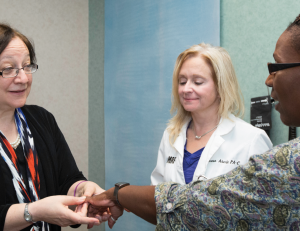March
Today, just 1 in 5,000 experimental compounds proves safe and effective enough to reach patients.
For new drugs, the road to hospitals and clinics is steep and long. Researchers screen countless promising compounds, but they choose only a few to begin clinical trials. Of those selected, roughly 9 out of 10 will fail. For that 10th, it takes an average of more than a decade to complete this journey.
With a pair of major new grants from the National Institutes of Health, researchers at OMRF are aiming to improve those numbers and, with them, patient outcomes.
The grants are part of an initiative known as AMP AIM, which focuses on accelerating the development of novel therapies for autoimmune conditions that include lupus and rheumatoid arthritis. The international partnership involves the NIH, for-profit drug and biotech companies, nonprofits, and 52 universities and research institutions like OMRF.
At OMRF, Drs. Judith James and Joel Guthridge received individual grants, and James was selected to chair the $58.5 million program. The strength of the effort, she believes, lies in numbers. “Our goal is to demonstrate that a team approach to science will achieve more than any single member or institution.”
Another key, says Dr. Robert Carter of the NIH, will be the multi-disciplinary makeup of the team, which includes investigators researching a host of different autoimmune illnesses. “Studying a suite of disorders will enable … cross-disease comparisons that may help us pinpoint those cells and pathways that are specific to each of these diseases and those that are shared,” Carter says.

Also in March, OMRF’s Dr. Joan Merrill served as the lead author on a study of an investigational lupus drug published in the influential New England Journal of Medicine. In a Phase 2 trial involving 117 clinics on four continents, the highest dose of the medication, iberdomide, showed a reduction of symptoms over 24 weeks in a cohort of nearly 300 patients.
Despite the positive results, Merrill says that “any given drug, no matter how sophisticated, is unlikely to work for every patient.” Still, with each new therapeutic option, increasingly sensitive disease monitoring tools can help physicians devise unique treatment plans for each person living with autoimmune disease. And that individualized approach, known as precision medicine, promises better outcomes for patients going forward.



